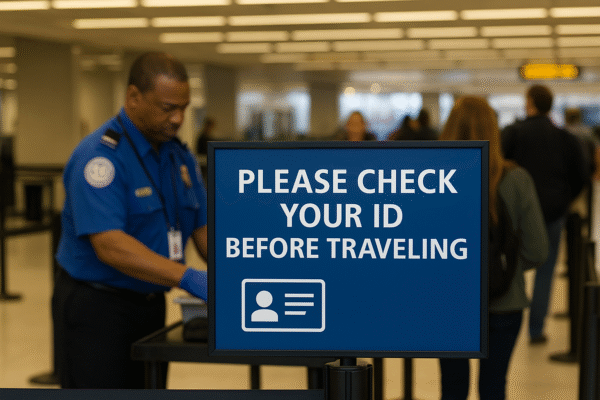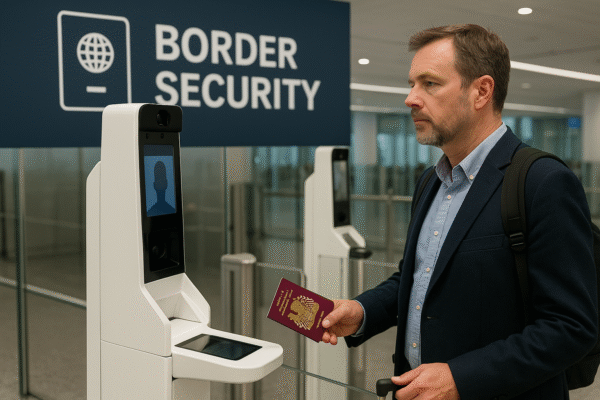Starting October 12, 2025, travelers from the United Kingdom heading to popular European destinations including France, Italy, Spain, Germany, and Greece will face new biometric border checks under the European Union’s Entry/Exit System (EES). This system is being introduced across Schengen zone countries to boost security and modernize border management—but it could significantly change how UK travelers plan and experience entry into Europe.
What Is the Entry/Exit System (EES)?
The EES is a digital border control system introduced by the European Union Agency for the Operational Management of Large-Scale IT Systems in the Area of Freedom, Security and Justice (eu-LISA). It will collect biometric data—including fingerprints and facial images—of non-EU citizens entering and exiting the Schengen Area.
Upon a traveler’s first entry into a participating Schengen country, they must submit biometric data at designated kiosks or booths in airports, ports, or land borders. The data will then be stored in a centralized database for up to three years, streamlining future visits but also increasing scrutiny.
Countries Affected by the New Rules
The EES will apply across 29 countries, including all 25 Schengen EU states such as France, Italy, Spain, Germany, Portugal, and Greece, as well as non-EU Schengen members like Norway, Switzerland, Iceland, and Liechtenstein.
These are some of the most frequented destinations by UK leisure and business travelers, and the changes are expected to affect millions of Britons who make regular trips to Europe.
Key Requirements and What Travelers Must Do
- Biometric Enrollment on Arrival:
All third-country nationals—including British passport holders—will be required to provide fingerprints and a facial photograph upon first arrival. This will happen on-site at border entry points and may result in longer processing times, especially during peak travel periods. - No Pre-Registration Needed:
Unlike the forthcoming European Travel Information and Authorisation System (ETIAS), which requires online application, EES does not require pre-registration. All data is collected at the point of entry. - Passport Validity Rules:
The UK Foreign, Commonwealth & Development Office (FCDO) has reminded travelers that their passports must be:- Issued within the last 10 years
- Valid for at least 3 months after the date of departure from the Schengen area
- Schengen 90/180 Rule Enforcement:
The EES will automatically track time spent in the Schengen zone, reinforcing the 90 days in any 180-day period rule. Overstayers risk fines, deportation, and reentry bans.
Cruise, Ferry, and Eurostar Travel Exceptions
Travelers on cruises that begin and end in non-Schengen ports, such as Southampton or Liverpool, may not be subject to EES checks unless they disembark in the Schengen area for extended travel. However, disembarking for land travel (e.g., Paris or Barcelona) still requires entry processing under the new system.
Those arriving via Eurostar or ferries into ports like Calais, Dunkirk, or Amsterdam will undergo the same biometric procedures.
Impact on Travel Times and Airport Readiness
While the European Commission asserts the EES will reduce administrative workloads and combat identity fraud, initial implementation may result in significant delays, especially at high-volume airports such as Paris Charles de Gaulle (CDG), Rome Fiumicino (FCO), Barcelona El Prat (BCN), and Frankfurt International (FRA).
Airports across Europe are working to install new biometric booths and train border agents, but travel industry leaders like Airlines for Europe (A4E) have raised concerns about readiness and operational bottlenecks during the rollout.
Long-Term Traveler Benefits
Once enrolled, travelers’ biometric data will allow for faster future border crossings across all Schengen countries for up to three years. Return travelers won’t need to repeat full registration—only a quick biometric scan at borders.
This system will also simplify tracking overstays and automatically record entry/exit stamps, eliminating the need for manual passport stamping.
ETIAS Still Coming in 2026
While EES begins this October, the ETIAS—a separate requirement for UK and other non-EU nationals—will launch in mid-2026. ETIAS will require an online travel authorization and a €7 fee for travelers aged 18–70.
What Travelers Should Do Now
- Check your passport validity now and renew early if needed.
- Plan for extra time at European airports and land borders this autumn.
- Understand the 90/180 rule and monitor your days in the Schengen area.
- Stay informed through updates from the UK FCDO and European Commission.
As Europe tightens its external border control systems, UK travelers must adapt to the new normal of digital and biometric travel. These changes mark a major shift in post-Brexit UK–EU mobility, placing greater emphasis on preparedness and compliance for seamless travel experiences across the continent.
For more travel news like this, keep reading Global Travel Wire



















